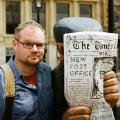
PLANS to turn over open space in Linnvale to housing have been thrown out by the Scottish Government.
The planning reporter considering the local development plan for West Dunbartonshire (LDP2) concluded the benefit of 100 homes next to Strauss Avenue was outweighed by the “harm” of removing public open space.
Council officials and the local SNP administration had previously argued that the site had to be opened to housing to prevent Duntiglennan Fields being taken over. It was portrayed as a specific “us or them” clash between the two sites.
But with the planning reporter also agreeing to protect Duntiglennan, both communities have won out against private housing firms and council officials – for now.
It will be up to councillors on the planning committee in August to adopt the reporter’s recommendations.
Labour councillor John Mooney, who represents the area, resigned from the committee last year to fight with residents and praised the reporter’s conclusions.
He told the Post: “With the reaffirmation of Strauss Avenue and Duntiglennan Fields as protected greenspace, I trust that we can draw a line under this, and that developers finally get the message.
“If they want to build in West Dunbartonshire, they need to build on brownfield. This is a great victory for community action and local democracy.”
Read more: Duntocher homes bid at Duntiglennan Fields hits stumbling block
He added: “I think that the SNP administration owe everyone an apology.”
Stuart Gray, one of the local campaigners against the Strauss Avenue development, said Cllr Mooney deserves an apology from council leader Jonathan McColl, who last year called Cllr Mooney’s council motion to consult residents as “disingenuous”.
Mr Gray said: “I’m glad there was such a fair assessment by the reporter and the overall decision was that the site was unsuitable and would be a tragic loss to the local community.”
Cllr McColl did not reply to a request for comment.
The reporter said the land adjacent to Strauss Avenue was “not particularly attractive”. But he said it was clear from the more than 400 objections that the loss of the area was “of great concern”.
He concluded: “There is strong evidence that this open space is valued.
“The development of this site would make a modest contribution towards meeting an identified short-term shortfall in the Clydebank housing land supply. It might generate funds towards the improvement of some residual and nearby open space. The site is also well-located with regard to sustainable travel.
“However, I consider that these factors are outweighed by the harm that would be caused by the loss of a large area of public open space which has potential to address identified local open space deficiencies.
“I am also concerned about the poor residential environment that could be expected to be delivered on this site due to the effects of aircraft noise, and also the uncertainty regarding whether flood risk can be adequately mitigated.
“Given that the site was designated in the adopted local plan and earlier proposed local development plan as open space, I consider this is the most sensible designation for the site to revert to.”



Comments: Our rules
We want our comments to be a lively and valuable part of our community - a place where readers can debate and engage with the most important local issues. The ability to comment on our stories is a privilege, not a right, however, and that privilege may be withdrawn if it is abused or misused.
Please report any comments that break our rules.
Read the rules here